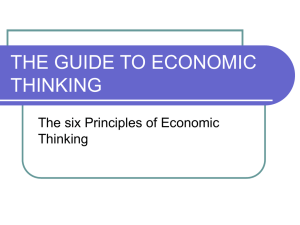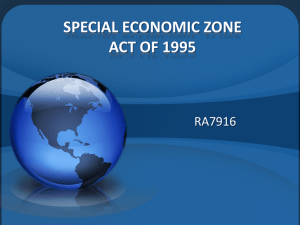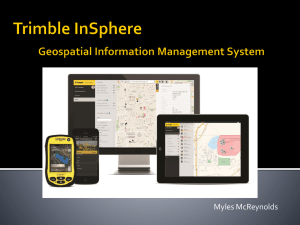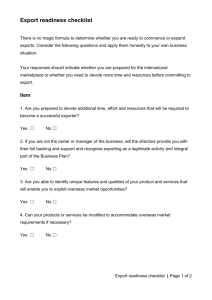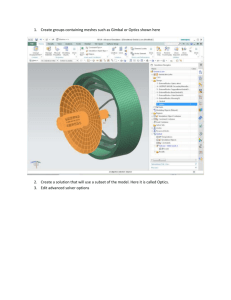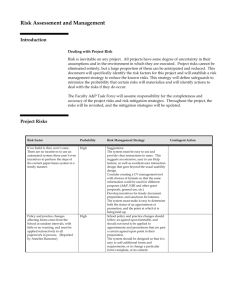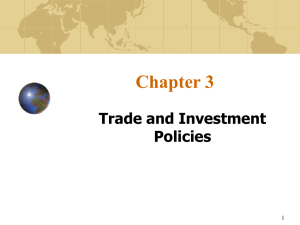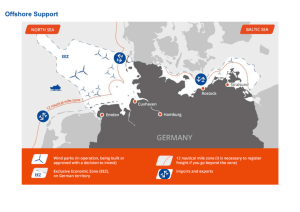Republic of the Philippines - Arangkada Philippines 2010
advertisement
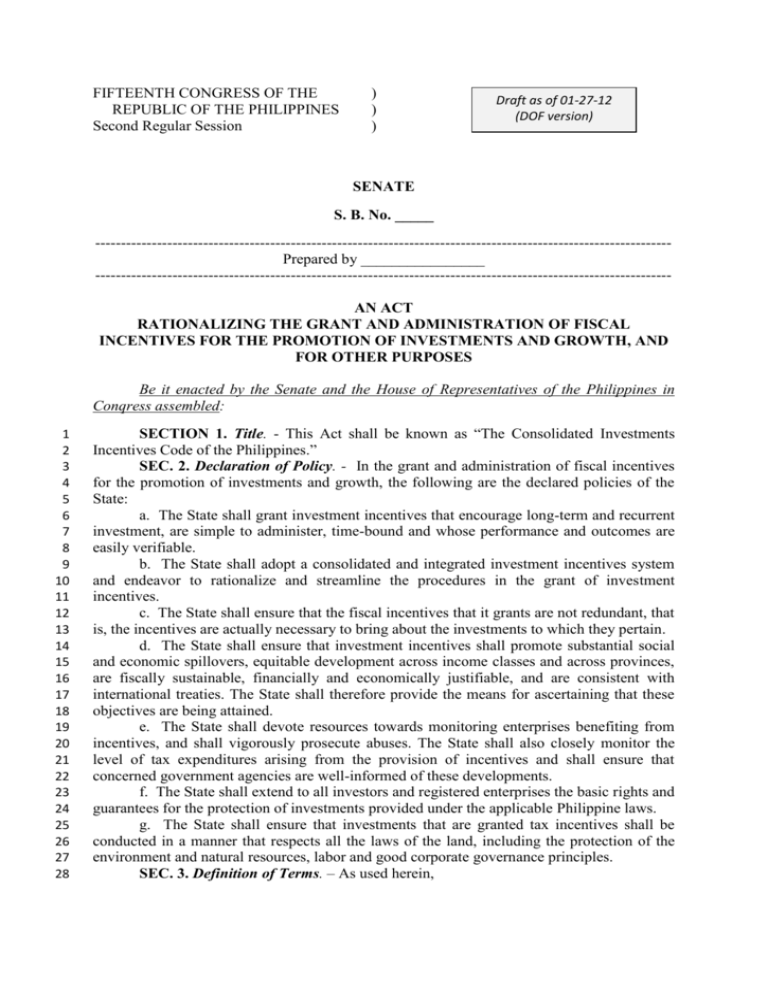
FIFTEENTH CONGRESS OF THE REPUBLIC OF THE PHILIPPINES Second Regular Session ) ) ) Draft as of 01-27-12 (DOF version) SENATE S. B. No. _____ ---------------------------------------------------------------------------------------------------------------Prepared by ________________ ---------------------------------------------------------------------------------------------------------------AN ACT RATIONALIZING THE GRANT AND ADMINISTRATION OF FISCAL INCENTIVES FOR THE PROMOTION OF INVESTMENTS AND GROWTH, AND FOR OTHER PURPOSES Be it enacted by the Senate and the House of Representatives of the Philippines in Conqress assembled: 1 2 3 4 5 6 7 8 9 10 11 12 13 14 15 16 17 18 19 20 21 22 23 24 25 26 27 28 SECTION 1. Title. - This Act shall be known as “The Consolidated Investments Incentives Code of the Philippines.” SEC. 2. Declaration of Policy. - In the grant and administration of fiscal incentives for the promotion of investments and growth, the following are the declared policies of the State: a. The State shall grant investment incentives that encourage long-term and recurrent investment, are simple to administer, time-bound and whose performance and outcomes are easily verifiable. b. The State shall adopt a consolidated and integrated investment incentives system and endeavor to rationalize and streamline the procedures in the grant of investment incentives. c. The State shall ensure that the fiscal incentives that it grants are not redundant, that is, the incentives are actually necessary to bring about the investments to which they pertain. d. The State shall ensure that investment incentives shall promote substantial social and economic spillovers, equitable development across income classes and across provinces, are fiscally sustainable, financially and economically justifiable, and are consistent with international treaties. The State shall therefore provide the means for ascertaining that these objectives are being attained. e. The State shall devote resources towards monitoring enterprises benefiting from incentives, and shall vigorously prosecute abuses. The State shall also closely monitor the level of tax expenditures arising from the provision of incentives and shall ensure that concerned government agencies are well-informed of these developments. f. The State shall extend to all investors and registered enterprises the basic rights and guarantees for the protection of investments provided under the applicable Philippine laws. g. The State shall ensure that investments that are granted tax incentives shall be conducted in a manner that respects all the laws of the land, including the protection of the environment and natural resources, labor and good corporate governance principles. SEC. 3. Definition of Terms. – As used herein, 1 2 3 4 5 6 7 8 9 10 11 12 13 14 15 16 17 18 19 20 21 22 23 24 25 26 27 28 29 30 31 32 33 34 35 36 37 38 39 40 41 42 43 44 45 46 47 48 49 a. “Authority/ies” shall refer to government entities created by law, executive order, decree or other issuance, in charge of promoting investments and administering the operations of the different economic zones and freeports in accordance with their respective charters. These include the Philippine Economic Zone Authority (PEZA), Bases Conversion Development Authority (BCDA), Subic Bay Metropolitan Authority (SBMA), Clark Development Corporation (CDC), Poro Point Management Corporation (PPMC), Bataan Technology Park, Inc. (BTPI), Cagayan Economic Zone Authority (CEZA), Zamboanga City Special Economic Zone Authority (ZCSEZA), Phividec Industrial Authority (PIA), Aurora Pacific Economic Zone and Freeport Authority (APECO), Authority Of The Freeport Area Of Bataan (AFAB), Tourism Infrastructure And Enterprise Zone Authority (TIEZA), and all other authorities that may be created by law in the future: Provided, that in the case of PEZA, it shall also be in charge of administering the tax incentives for registered enterprises under this act. b. “Capital equipment” refers to machinery, equipment, major components thereof, spare parts, accessories, tools, devices, apparatus, fixtures, fittings and accompaniments which are directly and/or reasonably needed in the registered activity of the enterprise and those required for pollution abatement and control, cleaner production and water reduction/conservation. c. “Ecozone developer” shall refer to a business entity duly registered with PEZA to develop, operate and maintain an ecozone that will put up the required infrastructure facilities and utilities to include among others light and power system, water supply and distribution system, sewerage and drainage system, pollution control devices, communication facilities, paved road network, administration building, standard factory buildings, and other facilities as may be required by enterprises registered with PEZA. d. “Export sales of goods” shall mean the sales values and/or revenues paid for in freely convertible foreign currency, determined from invoices, bills of lading, inward letters of credit, landing certificates, or other commercial documents, of the following: (i) the sale and actual shipment of goods from the Philippines to a foreign country by a registered enterprise; (ii) sales of goods to an export enterprise registered in accordance with this Act; to diplomatic missions and to agencies or institutions allowed to import said goods tax and duty-free; to persons engaged in international shipping or international air transport operations; and to foreign military aircraft or sea craft; (iii) sales to a nonresident buyer for delivery to a resident local export enterprise of capital equipment, raw materials, production supplies, packaging materials and other production requirements needed for the registered activity of the export enterprise; or Provided, That in the case of paragraph (ii) above, only sales to an export enterprise of capital equipment, raw materials, production supplies, packaging materials, and other production requirements needed for the registered activity of the export enterprise; and sales to international sea or air transport operations of goods, equipment, spare parts and supplies, except fuel, to be used in the aircraft or sea craft and capital equipment needed for the shipping or air transport operations, shall be entitled to incentives for export enterprises under this Act. e. “Export sales of services” shall mean the sales revenues, determined from contracts, invoices, vouchers, official receipts, or other commercial documents paid for in freely convertible foreign currency, of the following: (i) services rendered to non-resident foreign clients by registered enterprises; (ii) services rendered to an export enterprise registered in accordance with this Act; 2 1 2 3 4 5 6 7 8 9 10 11 12 13 14 15 16 17 18 19 20 21 22 23 24 25 26 27 28 29 30 31 32 33 34 35 36 37 38 39 40 41 42 43 44 45 46 47 48 49 (iii) services rendered to diplomatic missions and to other agencies or institutions with tax and duty-free privileges; (iv) services rendered to persons engaged in international shipping or international air transport operations, or foreign military aircraft or sea craft, even if rendered locally. Provided, That in the case of paragraph (ii) above, only services to an export enterprise performed by subcontractors and/or contractors in the manufacture or processing of goods; other services necessary for the registered activity of an export enterprise; and in the case of paragraph (iii), only services for the overhaul, repair and maintenance for international shipping or air transport operations, and foreign military aircraft or sea craft, shall be entitled to incentives for export enterprises under this Act. f. “Export enterprise” shall mean a registered enterprise which is a manufacturer, processor or service provider and whose export sale of its products or services exceeds seventy percent (70%) of its total annual production of the preceding taxable year. An export trader that buys and sells for its own account products of micro and small enterprises and earns one hundred percent (100%) of its annual sales from exports of the same shall be deemed to be an export enterprise. g. “Freeport” is an isolated and policed area adjacent to a port of entry as defined by Section 3519 of the Tariff and Customs Code, which shall be operated and managed as a separate customs territory to ensure free flow or movement of goods, except those expressly prohibited by law, within, into and exported out in the freeport zone where imported goods may be unloaded for immediate transshipment or stored, repacked, sorted, mixed, or otherwise manipulated without being subject to import duties. h. “Gross Income Earned(GIE)” refers to gross sales or gross revenues derived from the registered activity less sales returns, discounts and allowances and cost of goods sold and/or cost of services rendered, as defined under Section 27(E)(4) of the NIRC of 1997,as amended. i. “Investment incentive” or “fiscal incentives” or “tax incentives” shall refer to the preferential tax treatment of a registered enterprise in terms of lower tax, exemption from tax or duties, tax or duty refund, double deduction of expense for purposes of computing one’s income tax liability, accelerated depreciation, net loss carry-over, among others. j. “Less Developed Areas (LDAs)” shall refer to the most recent list of the thirty (30) poorest provinces of the Philippines at the time of application, as determined by the National Economic Development Authority (NEDA). The list shall be updated no less oftener than every three (3) years. A registered enterprise located in LDAs shall be entitled to the fiscal incentives herein provided to the extent of the registered activity or project involving only export sales of goods and export sales of services as herein defined, and not in any other activity or project; otherwise, income from such other activity or project will be subject to appropriate taxes under the National Internal Revenue Code (NIRC), as amended. k. “Qualified Micro and Small Enterprise (MSE)” shall mean, for purposes of the grant of fiscal incentives herein, any individual, partnership, cooperatives, corporation organized and existing under the laws of the Philippines, whose gross revenue does not exceed Two Million Pesos (PhP 2,000,000.00) for a taxable year: Provided, That every three (3) years from the date of effectivity of this Act, the amount stated herein shall be adjusted to reflect its value as of said date using the Consumer Price Index, as published by the National Statistics Office (NSO). l. “Registered enterprise” shall mean any individual, partnership, corporation, Philippine branch of a foreign corporation or other entity incorporated and/or organized and existing under Philippine laws, engaged in the export sales of goods or export sales of 3 1 2 3 4 5 6 7 8 9 10 11 12 13 14 15 16 17 18 19 20 21 22 23 24 25 26 27 28 29 30 31 32 33 34 35 36 37 38 39 40 41 42 43 44 45 46 47 48 services in a Freeport, Special Economic Zone, or in a Less Developed Area, that is, the enterprise has established presence and substantial operations in said areas, and registered with an Authority as defined in this Act: Provided, however, That the term “registered enterprise” shall not include any of the following service enterprises such as, but not limited to, those engaged in customs brokerage, trucking/forwarding services, parcel services, janitorial services, security services, insurance and/or banking and other financial services, consumers cooperatives, credit unions, consultancy services, restaurants or such other services, within the economic zones, as may be determined by the Board of the concerned authority, duly accredited and/or licensed by any of the Authorities and whose income derived within the economic zones shall be subject to taxes under the National Internal Revenue Code of 1997 (NIRC, as amended). m. “Special economic zone” or “ecozone” shall refer to a selected area with highly developed or which has the potential to be developed into agro-industrial, industrial, information technology, tourist/recreational, commercial, banking, investment and financial centers whose metes and bounds are fixed or delimited by Presidential Proclamations. An ecozone may contain any or all of the following: industrial estates (IEs), export processing zones (EPZs), ICT parks and centers, free trade zones and tourism estates; Provided, however, That areas where mining operations are undertaken shall not be declared as ecozones. n. “Source documents” shall refer to input materials and documents reasonably needed by information technology (IT) and IT-enabled industries such as, but not limited to, books, directories, magazines, newspapers, brochures, pamphlets, medical records or files, legal records or files, instruction materials, drawings, blueprints, or outlines. SEC. 4. Governing Tax Incentive Provision for All Authorities. – Notwithstanding the provisions of their respective charters, all existing and future Authorities shall offer only tax incentives granted under this Act: Provided, That the incentives granted under this Act to a registered enterprise shall be applicable to the extent of the registered activity or project only: Provided, further, That incentives in the form of income tax holiday presently enjoyed by existing enterprises shall continue until the end of the period for which it is granted or for a period of not more than four (4) years from the effectivity of this Act, whichever comes first. SEC. 5. Restructuring of the Board of Investments. a. The Board of Investments (BOI), created under Executive Order No. 226, is hereby restructured, and its charter accordingly amended, to be the principal investments promotions agency of the country. b. The functions of the BOI pertaining to the registration of enterprises and the administration of fiscal and non-fiscal incentives under EO 226 are hereby transferred to the PEZA. c. Powers and Duties of the BOI. The BOI shall be primarily responsible for the promotion of investments in the Philippines, and as such, shall have the following powers and functions: 1) Develop an investment promotion strategy for the Philippines; 2) Formulate, coordinate, and monitor investment promotion activities; 3) Target, project, and generate investment opportunities; 4) Identify effective marketing methods and approaches to promote investment; 5) Service the (marketing and promotion) needs of investment clients; 6) Formulate position on bilateral, regional, or multilateral investments agreements or arrangements with respect to investment promotion; and 4 1 2 3 4 5 6 7 8 9 10 11 12 13 14 15 16 17 18 19 20 21 22 23 24 25 26 27 28 29 30 31 32 33 34 35 36 37 38 39 40 41 42 43 44 45 46 47 48 7) Exercise all powers necessary or incidental to fulfill its mandate as the principal investment promotions agency of the country. SEC. 6. Roles of PEZA and Other Authorities. - The respective Charters of PEZA and all other Authorities shall continue to be in force, except that the provisions on investment incentives therein are hereby repealed and replaced by this Act. Unless otherwise provided herein, the PEZA and other Authorities shall implement investment laws in accordance with their own Charters and this Act. Notwithstanding the provisions of RA 7916, as amended, the PEZA shall be responsible for administering all investment incentives to registered enterprises under this act, including to those registered by Authorities other than itself. The PEZA shall also be responsible for both registering and administering incentives to export industries in Less Developed Areas (LDAs) as defined herein, that may qualify for tax and non-tax incentives under this Act. SEC. 7. Fiscal Incentives to Registered Enterprises. – The PEZA shall administer the following fiscal incentives to the registered export enterprises to the extent of their registered activity: a. Income tax-based incentive – The registered enterprise may choose any one of the following options as its income tax-based incentive, for a period of ten (10) years which shall be non-extendable, subject to the condition that its choice shall be final and cannot be changed during the duration of its registration. Provided further that on availing of the income tax-related incentives, the BIR shall require a registered export enterprise to secure a Certificate of Eligibility from the appropriate Authority and attach the same to its Income Tax Return (ITR) or Annual Information Return (AIR), whichever is applicable. Thereafter, the registered export enterprise shall file its claim with PEZA for validation. PEZA shall endorse the result of its validation to the BIR within six (6) months from the deadline for the filing of the ITR or AIR as the case maybe. Failure to secure and attach the certification to the ITR or AIR, and/or file the income tax-related availment for validation by PEZA shall cause the forfeiture of the income tax-related availment for the taxable period. Option 1: Gross Income Earned (GIE). – A registered enterprise may avail of the five percent (5%) tax on GIE in lieu of all national and local taxes, except Value Added Tax (VAT) and Real Property Tax on land owned by private developers. Within six (6) months from the effectivity of this law, the BIR shall review its regulations on the computation of GIE to ensure that only direct costs, or cost of goods sold and/or services rendered, shall be deductible from gross revenues, and recommend stricter rules to the Secretary of Finance if warranted. In the allocation of the revenues from the 5% tax on GIE, three percent (3%) shall be remitted to the National Government and two percent (2%) shall be remitted to the treasurer’s office of the local government unit/s where the registered export enterprise is located or in case of enterprises inside an ecozone or free port, where the ecozone or free port is located. Option 2: Reduced Income Tax (RIT). – A registered export enterprise may be entitled to a reduced income rate of fifteen percent (15%) instead of the regular income tax rate provided for in the NIRC, as amended. In computing net taxable income, the enterprise may be entitled to deduct the following expenses, in addition to ordinary and necessary business expenses allowed under the NIRC, as amended: (i) Enhanced Net Operating Loss Carry-over (NOLCO) – The net operating loss of the registered activity during the first five (5) years from the start of commercial operation which had not been previously offset as deduction from gross income 5 1 2 3 4 5 6 7 8 9 10 11 12 13 14 15 16 17 18 19 20 21 22 23 24 25 26 27 28 29 30 31 32 33 34 35 36 37 38 39 40 41 42 43 44 45 46 47 48 may be carried over as deduction from gross income for the next five (5) consecutive taxable years immediately following the year of such loss. (ii) Accelerated Depreciation – Plant, machinery, and equipment that are reasonably needed and actually used for the production and transport of goods and services may be depreciated using a rate not exceeding twice the rate which would have been used had the annual allowance been computed in accordance with the rules and regulations prescribed by the Secretary of Finance and the provisions of the NIRC, as amended. (iii) Double Deduction for Training Expenses – Expenses incurred for local training given to employees for the development of skills, identified as necessary by the appropriate government agencies and approved by PEZA, may be claimed as deduction from gross income to the extent of two hundred (200%) percent of the actual amount of expenses incurred: Provided, that the training expense shall be deductible on the taxable year the said training expenses were incurred: Provided further, that PEZA shall issue the corresponding certificate of entitlement for its incentive upon filling of an application, otherwise, the training incentive shall be deemed waived. (iv) Double Deduction for Research and Development – Expenses incurred for research and development conducted in the Philippines relating to the business shall entitle the registered export enterprise to a special deduction from taxable income equivalent to one hundred percent (100%) of the total expenses over and above the allowable ordinary and business deductions for said expenses under the NIRC, as amended: Provided, that the expenses for research and development shall be deductible from gross income on the taxable year the said research and development expenses were incurred; Provided further, that PEZA shall issue the corresponding certificate of entitlement for this incentive upon filing of an application, otherwise, the research and development incentive shall be deemed waived. Provided, however, that in no case shall any registered enterprise pay an income tax less than three percent (3%) of their gross revenue. b. Value-added Tax and Customs Duty Treatment of Imported Capital Equipment and Raw Materials by Registered Export Enterprises. – 1. Located Inside an Economic Zone and/or Freeport Zone: VAT and Duty Exemption (a) Importation of capital equipment, including consignment thereof, by registered export enterprises may be exempted to the extent of one hundred percent (100%) of the taxes and customs duties; Provided, that the following conditions are complied: (i) The capital equipment is directly and/or reasonably needed and will be used exclusively in the registered activity of the export enterprise unless prior approval of PEZA is secured for the part time utilization of said equipment in a non-registered activity to maximize usage thereof or the proportionate taxes and duties are paid on a specific equipment and machinery being permanently used for non-registered activities; They are not manufactured domestically in sufficient quantity, of comparable quality and at reasonable prices; and (ii) The approval of PEZA was obtained by the registered export enterprise for the importation of such machinery, equipment and spare parts. 6 1 2 3 4 5 6 7 8 9 10 11 12 13 14 15 16 17 18 19 20 21 22 23 24 25 26 27 28 29 30 31 32 33 34 35 36 37 38 39 40 41 42 43 44 45 46 47 48 49 Approval of PEZA must be secured before any sale, transfer or disposition of the imported capital equipment is made: Provided, That if such sale, transfer or disposition is made within the first five (5) years from date of importation, any of the following conditions must be present: (i) If made to another enterprise enjoying tax and duty exemption on imported capital equipment; (ii) If made to another enterprise, upon payment of any taxes and duties due on the net book value of the capital equipment to be sold; (iii) Exportation of capital equipment, machinery, spare parts or source documents or those required for pollution abatement and control; or (iv) For reasons of proven technical obsolescence. When the aforementioned sale, transfer or disposition is made under any of the conditions provided for in the foregoing paragraphs other than paragraph (ii), the registered export enterprise shall not pay the taxes and duties waived on such items: Provided further, That if the registered export enterprise sells, transfers or disposes the aforementioned imported items without prior approval within five (5) years from the date of importation, the registered export enterprise and the vendee, transferee, or assignee shall be solidarily liable to pay twice the amount of the tax and duty exemption given it: Provided finally, That even if the sale, transfer or disposition of the capital equipment is approved after five (5) years from the date of importation, the registered export enterprise is still liable to pay the taxes and duties based on the net book value of the capital equipment if it has violated any of its registration terms and conditions. Otherwise, it shall no longer be subject to the payment of the taxes and duties waived thereon. (b) Importation of raw materials, supplies, spare parts and semi-finished products exclusively used by registered export enterprises in the manufacture, processing or production of its export products may be exempted from the payment of customs duties and taxes. The registered export enterprises availing of the above incentives shall be subject to the following: (a) that said importation will be used exclusively by the registered export enterprise in its registered activity; (b) that the capital equipment where the raw materials, supplies, parts and semi-finished products were used would have qualified for tax and duty-free importation; and (c) that the approval of PEZA is obtained by the registered export enterprise. If the registered export enterprise sells, transfers or disposes of the imported capital equipment, the provision in the preceding paragraphs for such disposition shall apply. 2. Located outside Economic and/or Freeport Zones: VAT and Duty Refund. Registered export enterprises located outside the ecozones or free ports shall be subject to a VAT and Customs Duty Refund Mechanism as provided in this Act. The VAT and customs duty paid on imported capital equipment may be refunded provided that the capital equipment is being used by the registered export enterprise pursuant to its registered activity. The amount of VAT and customs duty refund on a particular shipment of raw materials shall be equivalent to the proportion of raw materials used in the production of the exported goods to the total raw materials imported multiplied by the amount of VAT and customs duty paid on such importation. No claim for refund shall be 7 1 2 3 4 5 6 7 8 9 10 11 12 13 14 15 16 17 18 19 20 21 22 23 24 25 26 27 28 29 30 31 32 33 34 35 36 37 38 39 40 41 42 43 44 45 46 47 48 49 allowed on VAT and customs duty paid on raw materials which are not or no longer intended to be used in the registered export activity. In order to facilitate the immediate processing, clearance and release of VAT and customs duty refunds as provided in this Act, a Trust Liability Account (TLA) is hereby authorized to be established in the Bureau of Treasury (BTr). All VAT and customs duty payments pertaining to the importation of registered export enterprises of capital equipment, raw materials or source documents in the case of IT export enterprise shall be deposited in the TLA for the purpose of funding valid VAT and customs duty refund claims. The claims for VAT and customs duty refunds shall be made by the registered export enterprise with the Bureau of Customs (BOC). However, the VAT refund shall only be granted upon obtaining a favorable endorsement from the Bureau of Internal Revenue (BIR). A registered export enterprise shall file a claim for VAT and customs duty refund within one (1) year from the date of actual exportation. All amounts paid but no longer allowed for refund shall immediately accrue to the general fund of the National Government. All applications for VAT and customs duty refund shall be processed and acted upon within thirty (30) days after submission of complete documents. The refund shall be in a form of manager’s/cashier’s check payable to the registered export enterprise. In cases of dispute under the VAT and customs duty refund mechanism provided in this section, the pertinent provisions of the NIRC, as amended, and the Tariff and Customs Code of the Philippines, as amended, shall apply. 3. Tax and Duty Free Importation of Source Documents. – The importation of source documents by ICT-registered export enterprises inside the zone shall be eligible for tax and duty free importation. The tax incentive may be granted to the registered export enterprise for a period of 10 years. 4. VAT Incentive on Local Sales to Registered Export Enterprises. – (i) The sale of raw materials, packaging materials and capital equipment, directly used in the registered activity, by a VAT – registered enterprise to a registered export enterprise shall be subject to zero percent (0%) VAT. (ii) The sale of services performed by subcontractors and/or contractors in processing, converting or manufacturing goods for a registered export enterprise shall be subject to zero percent (0%) VAT, in accordance with the provisions of the NIRC of 1977, as amended. The VAT and duty incentives under this sub-section may be granted to the registered export enterprise for the duration of its registration with the pertinent authority. SEC. 8. Entitlement to Fiscal Incentives by Registered Enterprises – Registered enterprises shall be entitled to the fiscal incentives under the preceding Section to the extent of the registered activity or project involving only export sales of goods and export sales of services, as herein defined. Conversely, registered enterprises are not entitled to the aforesaid incentives if the activity or project they seek to register does not involve export sales of goods and export sales of services even though they are located in the freeports or ecozones. Income derived from such other activity or project shall, thus, be subject to appropriate taxes under the NIRC, as amended. SEC. 9. Fiscal Incentives To MSE - Qualified MSE as defined under this Act, shall register with the Bureau of Internal Revenue, and from the date of the registration of said 8 1 2 3 4 5 6 7 8 9 10 11 12 13 14 15 16 17 18 19 20 21 22 23 24 25 26 27 28 29 30 31 32 33 34 35 36 37 38 39 40 41 42 43 44 45 46 47 48 qualified MSE, for up to a non-extendible period of five (5) years shall be subject to fifteen percent (15%) on taxable net income. SEC. 10. Authority of the Bureau of Customs (BOC) to Examine the Entry and Exit of Imported Articles in the Economic Zones and Free Ports. – The BOC shall have the authority to examine the entry and exit of imported articles into the economic zones and free ports for the purpose of determining the quantity and description of subject imported articles and to determine whether proper duties and taxes, if any, had been paid thereon. SEC. 11. Percentage of Income Allowable from Sources within the Customs Territory or Sources from Local Sales. – Registered export enterprises located in ecozones and free ports may generate income from sales to the customs territory of up to thirty percent (30%) of their total income from all sources: Provided, That should an enterprise’s income from sources within the customs territory or from local sales exceed 30% of its total income from all sources, then, its entire income, including income from within the customs territory or local sales, shall be subject to the regular income tax provisions of the National Internal Revenue Code, as amended. In other words, it foregoes its privilege of enjoying all tax incentives for the pertinent period. SEC. 12. No Double Registration of Enterprises. - Export or domestic enterprises shall not be allowed to register their export or domestic activity in more than one Authority. In the event that an enterprise shall transfer to another Authority, only the remaining unutilized incentives shall be granted to the enterprise or the transferee, vendee, or assignee. SEC. 13. No Extension of Period for Availment of Incentives. – The availment period of the incentives provided herein shall be non-extendible. SEC. 14. Administration, Implementation and Monitoring of Incentives. - The PEZA shall be responsible for the administration and implementation of incentives granted to the registered enterprises. For Qualified MSEs, the BIR shall be responsible for the administration and implementation of incentives granted thereto. The PEZA and the BIR shall submit to the DOF their respective tax expenditures based on the computed cost in terms of revenue foregone on the tax incentives granted to their registered enterprises, and other data related to the grant of investment incentives, on a quarterly basis and to cover all their registered enterprises including those whose incentives are provided by investment incentive laws prior to the effectivity of this Act. For proper monitoring, the DOF, together with the BIR and BOC, shall create a single database of all incentives provided by PEZA. The DOF, BIR and BOC shall monitor and review the incentives granted and submit an annual report to the President and to the Chairman of the Committee on Ways and Means of both houses of Congress. SEC. 15. Membership in Boards of All Authorities – To ensure that the grant and administration of investment incentives are in accordance with the country’s medium-term economic development plan, are fiscally-sustainable and contributes to the growth and competitiveness of industries, the National Economic and Development Authority (NEDA), Department of Finance (DOF), and the Department of Trade and Investment (DTI) shall sit as members in the governing boards of all Authorities as defined in this Act. These agencies shall be represented in the said boards by officials with the rank of undersecretary of department or higher. For this purpose, the pertinent provisions of special laws and executive orders creating these Authorities are hereby amended accordingly. FINAL PROVISIONS SEC. 16. Suspension and Forfeiture of Incentives of Registered Enterprises, Refund and Penalties. - When there is probable cause to believe that the registered enterprise has violated its registration terms and conditions, the Authority may cause the suspension of 9 1 2 3 4 5 6 7 8 9 10 11 12 13 14 15 16 17 18 19 20 21 22 23 24 25 26 27 28 29 30 31 32 33 34 35 36 37 38 39 40 41 42 43 44 45 46 47 48 49 the incentives being enjoyed by the enterprise by issuing a notice of violation and recommendation of suspension of incentives addressed to PEZA. Upon a finding of violation of registration terms and conditions, the Authority may impose fines and penalties and/or cause the revocation of the incentives granted to the erring registered enterprise by issuing to PEZA a recommendation to this effect, without prejudice to the cancellation of the registration of said enterprise. In case of cancellation of the Certificate of Registration, the Authority may, in appropriate cases, require the refund of incentives availed of in addition to imposing fines and penalties, with due notice to and conformity of PEZA. Any enterprise which violates any provision of this Act, its implementing rules and regulations, the terms and conditions of its registration, or of any lawful directive of PEZA and/or the concerned Authority, shall be subject to a fine not to exceed One Million Pesos (P1,000,000.00), without prejudice to the disapproval of its application for registration or cancellation of its registration: Provided, That any willful commission of fraudulent misrepresentation in its application for registration or submission of reports or gross violation of this Act and its Implementing Rules and Regulations, a fine of at least One Million Pesos (P1,000,000.00) but not to exceed Ten Million Pesos (P10,000,000.00) shall be imposed, in addition to other penalties that may be imposed by the Authority. The Authorities shall prepare a schedule of fines and penalties to be imposed on erring registered enterprises depending on the violation incurred, which may be reduced in exceptional cases. Responsible officers of such enterprises, including duly appointed external consultants-agents who knowingly commit, aid or abet the commission of any of the acts mentioned above, shall be subject to a fine of not less than One Hundred Thousand Pesos (P100,000.00) but not more than Three Hundred Thousand Pesos (P300,000.00) without prejudice to disqualification from appearing or doing business with any Authority. Government officers and employees who participate directly or indirectly in the commission of the foregoing acts shall likewise be liable to a fine of not less than One Hundred Thousand Pesos (P100,000.00) but not more than Three Hundred Thousand Pesos (P300,000.00), in addition to any criminal and administrative penalties imposable under the Civil Service Law, Revised Penal Code, Republic Act No. 3019, otherwise known as the “Anti-Graft And Corrupt Practices Act,” Republic Act No. 6713, otherwise known as the “Code Of Conduct And Ethical Standards For Public Officials,” and other applicable laws. If the offender is a foreign national, in addition to the imposable fines and penalties above, the foregoing acts shall be grounds for his summary deportation. SEC. 17. Implementing Rules and Regulations (IRR). - The DTI, DOF and NEDA, in consultation with the DBM, BOI, PEZA, other Authorities and other concerned government agencies, shall jointly promulgate rules and regulations to implement the intent and provisions of this Act within one hundred twenty (120) days from effectivity of this Act. Such rules and regulations shall take effect fifteen (15) days following its publication in a newspaper of general circulation in the Philippines. SEC. 18. Separability Clause. - The provisions of this Act are hereby declared to be separable and, in the event any of such provisions is declared unconstitutional, the other provisions which are not affected thereby shall remain in force and effect. SEC. 19. Repealing Clause. a. To ensure that the NEDA, DOF, and DTI are represented in the governing boards of all Authorities, pursuant to Section 1 5 of this Act, the following provisions, among others, are amended accordingly: i. Article 4 of EO 226, as amended, or the “Omnibus Investment Code of 1987;” 10 1 2 3 4 5 6 7 8 9 10 11 12 13 14 15 16 17 18 19 20 21 22 23 24 25 26 27 28 29 30 31 32 33 34 35 36 37 38 39 40 41 42 43 44 45 46 47 48 ii. Sections 9 and 13 (c) of RA No. 7227 entitled “An Act Accelerating the Conversion of Military Reservations into Other Productive Uses, Creating the Bases Conversion and Development Authority for this Purpose, Providing Funds Therefor and for other Purposes (Bases Conversion and Development Act of 1992)”; iii. Section 3 of EO 80 entitled “Authorizing the Establishment of the Clark Development Corporation as the Implementing Arm of the Bases Conversion and Development Authority for the Clark Special Economic Zone, and Directing all Heads of Departments, Bureaus, Offices, Agencies and Instrumentalities of Government to Support the Program” (Clark Development Corporation); iv. Section 6 of EO 132 entitled “Authorizing the Creation of the Poro Point Management Corporation as the Implementing Arm of the Bases Conversion Development Authority over the Poro Point Special Economic and Freeport Zone and renaming the John Hay Poro Point Development Corporation as the John Hay Management Corporation;” v. Section 7 of RA No. 7922 entitled “An Act Establishing a Special Economic Zone and Free Port in the Municipality of Santa Ana and the Neighboring Islands in the Municipality of Aparri, Province of Cagayan, Providing Funds Therefor, and for Other Purposes (Cagayan Special Economic Zone Act of 1995);” vi. Section 9 of RA No. 7903 entitled “An Act Creating Special Economic Zone And Free Port in the City Of Zamboanga and Establishing for this Purpose the Zamboanga City Special Economic Zone Authority, Appropriating Funds Therefor, and for other Purposes (Zamboanga City Special Economic Zone Act of 1995)”; vii. Section 8 of RA No. 10083 entitled “An Act Amending Republic Act No. 9490, Otherwise Known as the Aurora Special Economic Zone Act of 2007” (Aurora Pacific Economic Zone and Freeport Act of 2010)”; viii.Section 14 of RA No. 9728 entitled, “An Act Converting the Bataan Economic Zone Located in the Municipality of Mariveles, Province of Bataan, into the Freeport Area of Bataan (FAB), creating for this purpose the Authority of the Freeport Area of Bataan (AFAB), Appropriating Funds Therefor and for Other Purposes or the “Freeport Area of Bataan Act of 2009”; and ix. Section 65 of RA No. 9593 entitled “An Act Declaring a National Policy for Tourism as an Engine of Investment, Employment, Growth and National Development, and Strengthening the Department of Tourism and its Attached Agencies to Effectively Efficiently Implement that Policy, and Appropriating Funds Therefor (The Tourism Act of 2009)”; b. The provisions on tax incentives that are hereby repealed accordingly include the following: i. Title III, Article 39 (a), (b), (c), (d), (e), (g), (i), (j), (k), (m) and (n); Title IV, and Book VI, Articles 77 and 78 of Executive Order No. 226, Series of 1987 entitled “The Omnibus Investments Code Of 1987”; ii. Sections 23 and 24 of RA No. 7916 entitled “An Act Providing For The Legal Framework And Mechanisms For The Creation, Operation, Administration, And Coordination Of Special Economic Zones In The Philippines, Creating 11 1 2 3 4 5 6 7 8 9 10 11 12 13 14 15 16 17 18 19 20 21 22 23 24 25 26 27 28 29 30 31 32 33 34 35 36 37 38 39 40 41 42 43 44 45 46 47 48 For The Purpose The Philippine Economic Zone Authority (PEZA), And For Other Purposes (The Special Economic Zone Act of 1995)”; iii. Section 4 of RA No. 8748 entitled “An Act Amending Republic Act No. 7916, Otherwise Known As The Special Economic Zone Act Of 1995”; iv. Section 17 (1) to (8) and Section 18 (a), (b), (c) and (f) of PD No. 66 entitled “Creating The Export Processing Zone Authority And Revising Republic Act No. 5490;” v. PD No. 529 (Restored y FIRB Resolution 19-87) entitled “Granting To Petroleum Exploration Concessionaires Under The Petroleum Act Of 1949 Exemption From Customs Duty And Compensating Tax On Importations Of Machinery And Equipment, Spare Parts And Materials Required For Their Exploration Operations;” vi. Sections 8, 9 and 2nd Sentence of the 1st Paragraph and 2nd Paragraph of Section 10 of PD No. 538 entitled “Creating And Establishing The Phividec Industrial Authority And Making It A Subsidiary Agency Of The Philippine Veterans Development Corporation, Defining Its Powers, Functions And Responsibilities, And For Other Purposes;” vii. Sections 36 (e) and (f) of PD No. 705 entitled “Revising PD No. 389, otherwise known as The Forestry Reform Code of The Philippines (Revised Forestry Code of the Philippines);” viii. Section 16 (a), (b) and (c) and Section 17 (a) to (e) of PD 972 entitled “Promulgating an Act to Promote an Accelerated Exploration, Development, Exploitation, Production And Utilization Of Coal (The Coal Development Act of 1976);” ix. Section 4 (a) and (d) of Presidential Decree No. 1442 - restored by FIRB Resolution 19-87, entitled, “An Act to Promote the Exploration And Development Of Geothermal Resources;” x. Section 10 (1) to (6) of RA No. 7156 entitled “An Act Granting Incentives to Mini-Hydro Electric Power Developers and For Other Purposes” (MiniHydroelectric Incentive Act);” xi. Sections 16 and 17 of RA No. 7844 entitled “An Act to Develop Exports as a Key towards the Achievement of the National Goals towards the Year 2000 (Export Development Act Of 1994);” xii. Chapter XV, Section 83; Chapter XVI, Sections 90, 91, 92, 93 of RA No. 7942 entitled “An Act Instituting a New System of Mineral Resources Exploration, Development, Utilization, and Conservation (Philippine Mining Act Of 1995);” xiii. Section 9 of RA No. 8479 entitled “An Act Deregulating the Downstream Oil Industry, and for Other Purposes (Downstream Oil Industry Deregulation Act Of 1998);” xiv. Section 3 (a) to (d) and (h) of RA No. 8502 entitled “An Act to Promote the Development of the Jewelry Manufacturing Industry, Providing Incentives Therefor and for other Purposes (Jewelry Industry Development Act of 1998);” xv. Chapter II, Article II, Sec. 35 (b), (c) and (d) of RA No. 8550, entitled “An Act Providing for the Development, Management and Conservation of the Fisheries and Aquatic Resources, Integrating All Laws Pertinent Thereto, and for other Purposes (The Philippine Fisheries Code Of 1998);” 12 1 2 3 4 5 6 7 8 9 10 11 12 13 14 15 16 17 18 19 20 21 22 23 24 25 26 27 28 29 30 31 32 33 34 35 36 37 38 39 40 41 42 43 44 45 46 47 48 49 xvi. Sections 1 and 2 and Section 6 of EO No. 528, Series of 2006, Amending EO No. 313, Series of 2004 – “Reducing the Rates of Duty on Capital Equipment, Spare Parts and Accessories Imported by BOI-registered new and expanding Enterprises”; xvii. Section 4 (e) and (f) of RA No. 7903 entitled “An Act Creating Special Economic Zone And Free Port in the City Of Zamboanga and Establishing for this Purpose the Zamboanga City Special Economic Zone Authority, Appropriating Funds Therefor, and for other Purposes (Zamboanga City Special Economic Zone Act of 1995);” xviii. Section 4 (b) and (c) of RA No. 7922 entitled “An Act Establishing a Special Economic Zone and Free Port in the Municipality of Sta. Ana and the Neighboring Islands in the Municipality of Aparri, Province of Cagayan, Providing Funds Therefor, And For Other Purposes (Cagayan Special Economic Zone Of 1995);” xix. Section 1 and Sections 2, 3, 4, 5 and 7 of RA No. 9400 entitled “An Act Amending RA 7227, as amended, otherwise known as The Bases Conversion and Development Act Of 1982, and for other Purposes;” xx. Section 1 of EO No. 619 entitled “Creating and Designating Special Economic Zones Pursuant to RA No. 7916, as Amended by RA No. 8784, in Relation to RA No. 7227, as Amended by RA No. 9400, Inside The Clark Freeport Zone”; xxi. Section 5 (A) to (M) and Section 9 of RA No. 9490, entitled “An Act Establishing the Aurora Pacific Economic and Freeport Zone in the Province of Aurora, Creating for the Purpose the Aurora Pacific Economic and Freeport Zone Authority, Appropriating Funds Therefor and for other Purposes (Aurora Special Economic Zone Act of 2007)”; xxii. Section 4 of RA No. 10083 entitled “An Act Amending RA No. 9490, Otherwise Known as the Aurora Special Economic Zone Act of 2007” (Aurora Pacific Economic Zone and Freeport Act of 2010)”; xxiii. Chapter II, Section 4 and Chapter VIII, Section 19 of RA No. 9295 entitled, “An Act Promoting the Development of Philippine Domestic Shipping, Shipbuilding, Ship Repair and Ship Breaking, Ordaining Reforms in Government Policies Towards Shipping in The Philippines and For Other Purposes (Domestic Shipping Development Act of 2004)”; xxiv. Sections 5, 6 and 10 of RA No. 9728 entitled “An Act Converting the Bataan Economic Zone Located in the Municipality of Mariveles, Province of Bataan, Into the Freeport Area of Bataan (FAB), Creating for this Purpose the Authority of the Freeport Area of Bataan (AFAB), Appropriating Funds Therefor and for other Purposes (Freeport Area of Bataan (FAB) Act of 2009)”; xxv. Subchapter V-A, Section 86 and Section 88 of RA No. 9593 entitled “An Act Declaring a National Policy for Tourism as an Engine of Investment, Employment, Growth and National Development, and Strengthening the Department of Tourism and Its Attached Agencies to Effectively and Efficiently Implement that Policy, and Appropriating Funds Therefor (The Tourism Act of 2009)”; xxvi. Chapter VII, Sections 15, 19, 21, 22 and 23 of RA No. 9513 entitled “An Act Promoting the Development, Utilization and Commercialization of Renewable Energy Resources and for other Purposes (Renewable Energy Act of 2008)”; 13 1 2 3 4 5 6 7 8 9 10 11 12 13 14 15 16 xxvii. Section 20 (d), Article V of RA No. 7279 entitled “An Act to Provide for a Comprehensive and Continuing Urban Development and Housing Program, Establish the Mechanism for its Implementation, and for other Purposes (Urban Development and Housing Act of 1992)”; xxviii. Section 7 of RA No. 9178 entitled “An Act to Promote the Establishment of Barangay Micro Business Enterprises (BMBEs), Providing Incentives and Benefits Therefor, and for other Purposes (Barangay Micro Business Enterprises (BMBEs) Act of 2002”; xxix. Chapter V, Art. 60 and 61 of RA No. 9520 entitled “An Act Amending the Cooperative Code of the Philippines to be Known as the Philippine Cooperative Code of 2008”. All other laws, acts, decrees orders and issuances or provisions thereof inconsistent with any of the provisions of this act are hereby repealed or modified accordingly. SEC. 20. Effectivity. - This Act shall take effect fifteen (15) days following its publication in a newspaper of general circulation in the Philippines. Approved, 14
